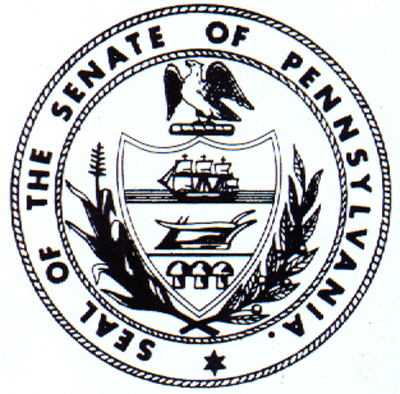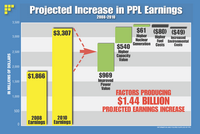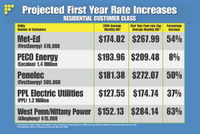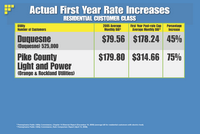|
|
||||||
STATE’S ELECTRIC CONSUMERS DESERVE RATE CAP EXTENSION
Fumo and other legislators have been in talks with utility companies in the
state to arrive at a fair method of pricing electric power that will protect
consumers against sharp increases that could be as high as 60 percent virtually
overnight. The electric utility industry is resisting many of their proposals.
Click Here to see more slides about this problems
BACKGROUND ON ESTABLISHMENT OF RATE CAPS THROUGH 2010 UNDER ELECTRIC DEREGULATION In 1996, the state enacted an electric deregulation law that provided no guarantee of better prices for consumers, beyond the vague general promise of lower rates through market competition. In fact, the bill was crafted essentially by and for utility companies in such a way that it created a windfall for them, with little likelihood of savings being passed on to consumers. The law was written with significant input from electric company lobbyists, in cooperation with the Ridge Administration and a small handful of friendly Republican legislators. The 84-page deregulation act was amended into a one-paragraph bill dealing with taxicab legislation, and passed during the lame duck session of 1996. Other than the small group involved in drafting the bill, most legislators saw it only a few days before it was amended into the taxicab bill and brought up for a vote in the Senate. With little time to react, Senator Vince Fumo quickly drafted an amendment that would have required 10 percent rate reductions for all customers. It was defeated on a straight party-line vote, with all Democrats in favor and all Republicans opposed. The bill then passed, 40-10. The bill permitted the utility companies the right to charge customers for the cost of their nuclear power plants, and allowed generation rates to longer be subject to Public Utility Commission control. With the pro-utility bill becoming law, Sen. Fumo attempted to gain consumer benefits through the courts. Utilities were required to file an implementation plan for approval with the Public Utility Commission. The first company to file was PECO, serving Philadelphia and the southeastern Pennsylvania region. PECO asked for the right to recapture from customers $7.46 billion worth of investments that would be unprofitable in a competitive market – investments in nuclear power plants. Tacked on to the bills of consumers, that “stranded cost recovery” charge would have fixed consumer electric bills at above market rates, despite competitive market forces. (Eventually, the six largest electric utilities in the state would request $18 billion worth of stranded cost recovery.) Sen. Fumo initiated litigation that was eventually supported by 30-some other parties, including state Consumer Advocate Sonny Popowsky, Community Legal Service of Philadelphia, ACORN, and most every consumer advocacy group in southeastern Pennsylvania. The suit challenged PECO’s windfall opportunity and its right to surcharge consumers for its unprofitable investments. Lengthy and complex legal proceedings ensued over the next approximately year and half, in front of the PUC and in the state courts. Potential competitor electric companies, notably Indianapolis Power and Light Co, entered the legal fight, and in some instances those companies joined forces with Sen. Fumo. In August of 1997, Sen. Fumo and his fellow litigants reached a settlement with PECO that permitted some stranded cost recovery – although less than the $7.46 billion that it initially sought -- but only because PECO guaranteed all customers 10-percent rate reductions that were to last for several years during the transition to a competitive market, as well as rate caps that would last until 2011. Several months later in October, Houston-based energy company Enron announced that it would double the rate cuts to 20 percent if it would be allowed to take over PECO’s market territory as the default supplier, which would essentially have made it the incumbent southeastern Pennsylvania utility in the competitive market. Realizing that the economic assumptions regarding the electricity market made Enron’s promises implausible – a judgment proven to be sound in light of Enron’s later collapse into bankruptcy and legal morass – Sen. Fumo decided to fight the Enron takeover attempt. He and many members of his legal coalition joined with PECO in an effort to preserve the settlement that they had achieved in August 1997. The PUC narrowly rejected the Enron proposal, and in April of 1998, a new settlement was reached with PUC input. It was less generous for consumers than the initial settlement, but still provided substantial benefits. The new settlement required PECO to abandon $2 billion worth of its stranded cost recovery request, reducing the amount to $5.46 billion and ending the recovery process in 2010. Consumers received an 8 percent immediate rate reduction in 1999, and a 6 percent rate reduction in 2000; after that, rates were capped at 1996 levels until December 31, 2010. The settlement in the PECO service territory was adopted by the PUC as a model for utilities in the rest of the state under deregulation. Eventually, the PUC would grant just $11 billion in stranded cost recovery of the $18 billion that Pennsylvania companies requested, but customers statewide enjoyed rate caps during the time that companies were transitioning to a competitive market environment. Click here to see a brief video clip from Senator Fumo's press conference on electric deregulation.
Click here to see
another video clip from the electric deregulation press conference. |





